新职业英语2_Unit2
- 格式:ppt
- 大小:3.88 MB
- 文档页数:82
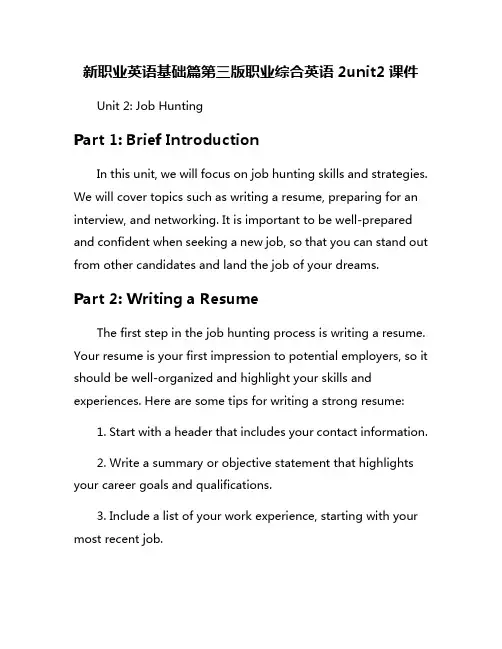
新职业英语基础篇第三版职业综合英语2unit2课件Unit 2: Job HuntingPart 1: Brief IntroductionIn this unit, we will focus on job hunting skills and strategies. We will cover topics such as writing a resume, preparing for an interview, and networking. It is important to be well-prepared and confident when seeking a new job, so that you can stand out from other candidates and land the job of your dreams.Part 2: Writing a ResumeThe first step in the job hunting process is writing a resume. Your resume is your first impression to potential employers, so it should be well-organized and highlight your skills and experiences. Here are some tips for writing a strong resume:1. Start with a header that includes your contact information.2. Write a summary or objective statement that highlights your career goals and qualifications.3. Include a list of your work experience, starting with your most recent job.4. List your education, including any degrees or certifications you have obtained.5. Include any relevant skills or qualifications that make youa strong candidate for the job.6. End with a list of references who can vouch for your skills and experiences.Part 3: Preparing for an InterviewOnce you have submitted your resume and been called for an interview, it is important to prepare thoroughly. Here are some tips for preparing for an interview:1. Research the company and the job position you are applying for.2. Practice answering common interview questions.3. Dress appropriately for the interview.4. Bring a copy of your resume and any other relevant documents.5. Prepare questions to ask the interviewer.6. Follow up with a thank-you note after the interview.Part 4: NetworkingNetworking is an important part of the job hunting process. By connecting with industry professionals and building relationships, you can increase your chances of finding job opportunities. Here are some tips for networking:1. Attend industry events and job fairs.2. Join professional organizations related to your field.3. Connect with professionals on LinkedIn.4. Reach out to former colleagues and classmates for job leads.5. Be proactive in seeking out networking opportunities.Part 5: ConclusionJob hunting can be a challenging process, but with the right skills and strategies, you can increase your chances of finding a job that is a good fit for you. By writing a strong resume, preparing for interviews, and networking effectively, you can stand out from other candidates and land the job of your dreams. Good luck!。

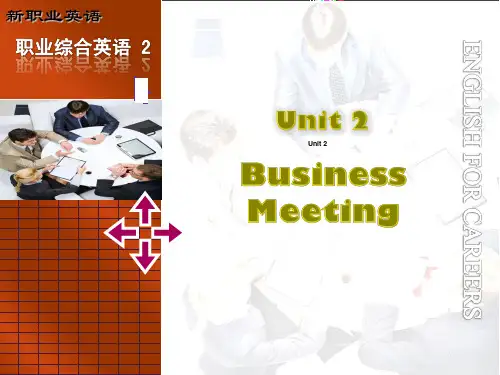
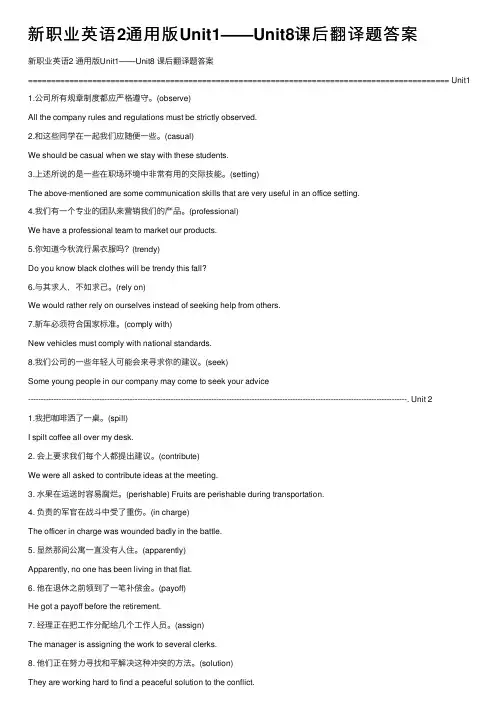
新职业英语2通⽤版Unit1——Unit8课后翻译题答案新职业英语2 通⽤版Unit1——Unit8 课后翻译题答案============================================================================================ Unit1 1.公司所有规章制度都应严格遵守。
(observe)All the company rules and regulations must be strictly observed.2.和这些同学在⼀起我们应随便⼀些。
(casual)We should be casual when we stay with these students.3.上述所说的是⼀些在职场环境中⾮常有⽤的交际技能。
(setting)The above-mentioned are some communication skills that are very useful in an office setting.4.我们有⼀个专业的团队来营销我们的产品。
(professional)We have a professional team to market our products.5.你知道今秋流⾏⿊⾐服吗?(trendy)Do you know black clothes will be trendy this fall?6.与其求⼈,不如求⼰。
(rely on)We would rather rely on ourselves instead of seeking help from others.7.新车必须符合国家标准。
(comply with)New vehicles must comply with national standards.8.我们公司的⼀些年轻⼈可能会来寻求你的建议。
(seek)Some young people in our company may come to seek your advice-----------------------------------------------------------------------------------------------------------------------------------------------------. Unit 21.我把咖啡洒了⼀桌。
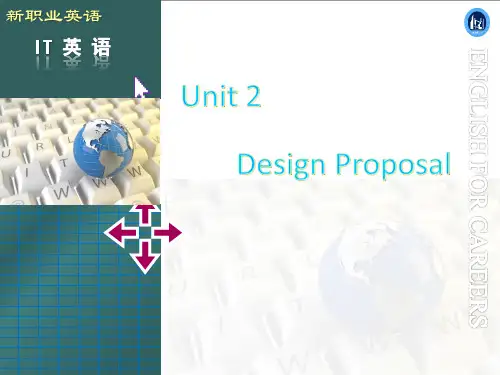
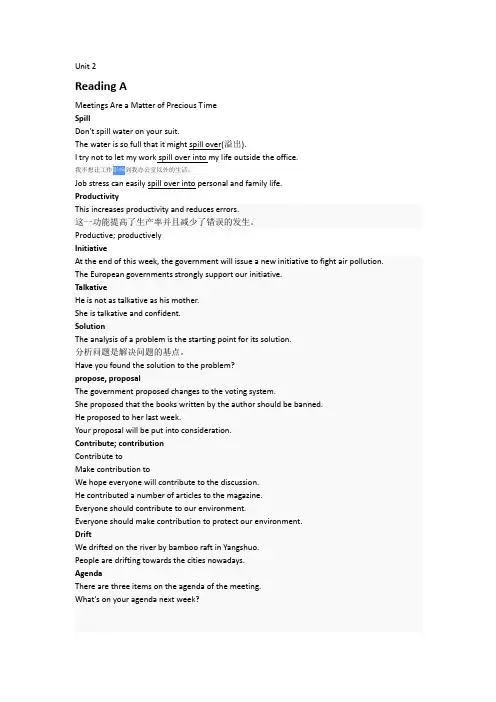
Unit 2Reading AMeetings Are a Matter of Precious TimeSpillDon't spill water on your suit.The water is so full that it might spill over(溢出).I try not to let my work spill over into my life outside the office.我不想让工作到我办公室以外的生活。
Job stress can easily spill over into personal and family life.ProductivityThis increases productivity and reduces errors.这一功能提高了生产率并且减少了错误的发生。
Productive; productivelyInitiativeAt the end of this week, the government will issue a new initiative to fight air pollution. The European governments strongly support our initiative.TalkativeHe is not as talkative as his mother.She is talkative and confident.SolutionThe analysis of a problem is the starting point for its solution.分析问题是解决问题的基点。
Have you found the solution to the problem?propose, proposalThe government proposed changes to the voting system.She proposed that the books written by the author should be banned.He proposed to her last week.Your proposal will be put into consideration.Contribute; contributionContribute toMake contribution toWe hope everyone will contribute to the discussion.He contributed a number of articles to the magazine.Everyone should contribute to our environment.Everyone should make contribution to protect our environment.DriftWe drifted on the river by bamboo raft in Yangshuo.People are drifting towards the cities nowadays.AgendaThere are three items on the agenda of the meeting.What’s on your agenda next week?—Assign, assignmentThe teacher assigned a different task to each of the students.We can assign him an important mission.I was assigned a pleasant room to work in.Written assignmentYou have got your first assignment.Resource ; sourceShe is working in human resource department.We should protect our limited natural resource.PerishableSuch kinds of flowers are perishable.There perishable foods must be kept in a refrigerator.NonethelessBut , however, neverthelessShe doesn’t know anything against him, nonetheless she doesn’t trust him.She doesn’t know anything against him, nevertheless she doesn’t trust him.Vague, vaguelyThe final letter is very vague, possibly an r or a k.They were vague about their backgrounds.I vaguely remember their house.我依稀记得他们的房子。

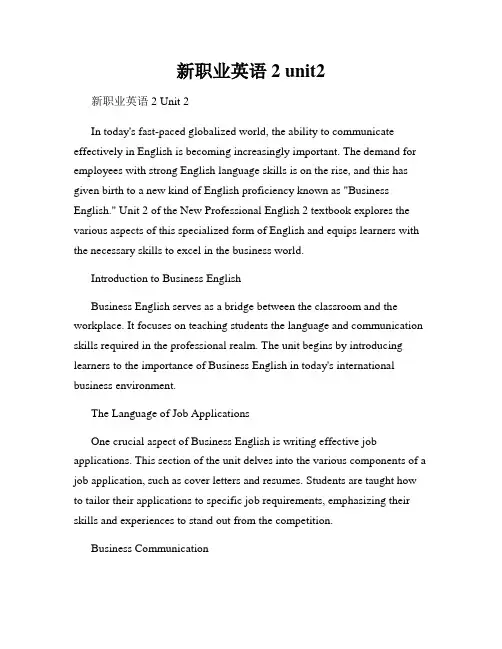
新职业英语2 unit2新职业英语2 Unit 2In today's fast-paced globalized world, the ability to communicate effectively in English is becoming increasingly important. The demand for employees with strong English language skills is on the rise, and this has given birth to a new kind of English proficiency known as "Business English." Unit 2 of the New Professional English 2 textbook explores the various aspects of this specialized form of English and equips learners with the necessary skills to excel in the business world.Introduction to Business EnglishBusiness English serves as a bridge between the classroom and the workplace. It focuses on teaching students the language and communication skills required in the professional realm. The unit begins by introducing learners to the importance of Business English in today's international business environment.The Language of Job ApplicationsOne crucial aspect of Business English is writing effective job applications. This section of the unit delves into the various components of a job application, such as cover letters and resumes. Students are taught how to tailor their applications to specific job requirements, emphasizing their skills and experiences to stand out from the competition.Business CommunicationClear and concise communication is vital in the business world. In this section, students learn how to effectively communicate through email, letters, and phone calls. They are introduced to common business phrases and expressions, enabling them to convey their messages professionally and assertively.Negotiation SkillsNegotiation is an essential skill in business. This section provides learners with the necessary language and strategies to negotiate successfully. They learn how to express their interests, trade-offs, and reach mutually beneficial agreements. Practical exercises and role-plays further enhance their negotiation skills.Business MeetingsAttending and participating in business meetings is a common occurrence in the corporate world. This section teaches students the language and etiquette required for fruitful interactions during meetings. They learn how to contribute their ideas, express agreement or disagreement, and handle various meeting scenarios.Business PresentationsThe ability to deliver effective presentations is highly valued in the professional world. In this section, learners are taught how to structure and deliver impactful presentations. They learn techniques for engaging the audience, using visual aids, and presenting data effectively.Cross-Cultural CommunicationIn the global business landscape, cultural sensitivity is crucial. This section addresses the challenges of cross-cultural communication and provides strategies to navigate them successfully. Students gain insights into different cultural norms and expectations, allowing them to communicate respectfully and avoid misunderstandings.ConclusionUnit 2 of the New Professional English 2 textbook equips learners with the essential language and communication skills needed to thrive in the business world. From job applications to presentations and cross-cultural communication, students develop the proficiency required to excel in various professional settings. By mastering Business English, individuals can enhance their career prospects and effectively navigate the globalized business environment.。
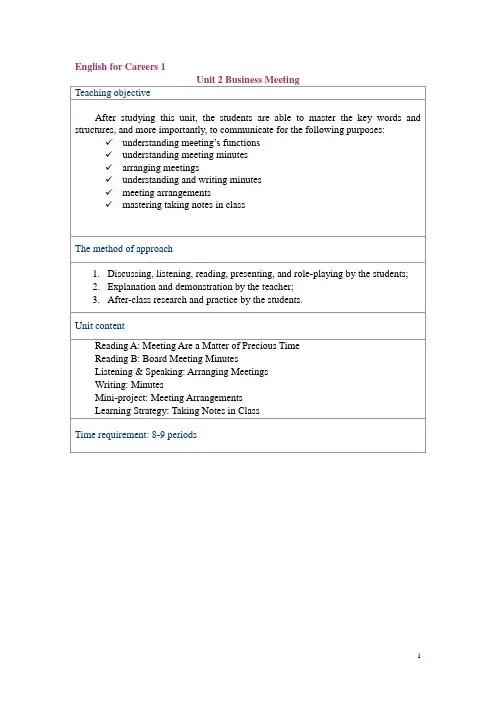
English for Careers 1Unit Focuschime in propose contribute (to) assignperishable vague disengaged effectiveexplicit specify tangible in chargeTeaching proceduresThis unit is arranged for a time span of 8 hours, during which a time limit is suggested for each step. Though it’s always important to keep a time limit in mind for each activity, a teacher should never stick to a rigid time plan in teaching, but rather follow a more flexible time table when dealing with unexpected in-class occurrences and make necessary adjustments accordingly.Note that not every step suggested here is a must in teaching. A teacher can make whatever changes he thinks necessary.Hour 1:Course introduction 45 minutes Warming-up Task 15 minutes Objective:Ss can identify different tasks at each stage of running a business meeting. Steps:• Ss read Warming-up Task.• Get Ss to read through the list of tasks.• Ask Ss to match the given tasks with the stages of a meeting.• Give the suggested answers.Suggested answers:New words in Reading A 15 minutes Objective: Ss can get familiar with the new words and expressions, etc.Steps:• Ss listen to the new words and expressions, etc.• Ss read the new words and expressions, etc.Notes: For a class with higher English proficiency, the teacher may follow thefollowing steps:• Ss preview the new words and expressions.• Ss read the new words and expressions.• Ss dictate several important new words and expressions.Discussions before Reading A 15 minutes Objective: Ss can get familiar with the new words and expressions, etc.Steps:• Ss know something abo ut Reading A.• Ss discuss the following two questions:1.In your opinion, what are meetings’ functions?2.How do we make meetings more productive?• Comment briefly on their work.Hours 2-3:Reading A 45 minutesLanguage points 35 minutesParagraph 1chime in: to join or interrupt a conversation; to agree with somethinge.g. He kept chiming in with his own opinions.The artist’s illustrations chime in perfectly with the text.Her expectation chimes in with the belief of many others.propose: v. to suggest a plan or idea, etc. for people to think about or decide one.g. The government proposed changes to the voting system.She proposed that the books written by the author should be banned.contribute (to): v. to speak during a meeting or a conversation, or write things for a newspaper, magazine, etc.e.g. We hope everyone will contribute to the discussion.He contributed a number of articles to the magazine.Paragraph 2assign: v. to give someone a particular job or responsibility; to give money, equipment, etc. to someone to usee.g. The teacher assigned a different task to each of the students.We can assign him an important mission.I was assigned a pleasant room to work in.Paragraph 3perishable: a. likely to decay or go bad quicklye.g. Such kinds of flowers are perishable.These perishable foods must be kept in a refrigerator.vague: a. of an uncertain, indefinite or unclear character or meaninge.g. The final letter is very vague, possibly an “R” or a “K”.The terms of the agreement were left deliberately vague.They were vague about their backgrounds.Paragraph 4disengaged: a. not involved with or interested in something or someone, and feeling separate from theme.g. He had a disengaged look in his eyes.One disengaged worker can affect the morale of the entire team.effective: a. successful in producing a desired or intended resulte.g. We must take effective measures to deal with these problems.Despite all modern technologies, the most effective form of communication is still face-to-face.explicit: a. stated clearly and in detail, leaving no room for confusion or doubte.g. He has an explicit understanding of the problem.He was quite explicit about what he expected us to do for him.He gave me explicit directions on how to get there.specify: v. to state something in an exact and detailed waye.g. Please specify when you will be at home tomorrow.Remember to specify your size when you order clothes.The regulations specify that calculators may not be used in the examination. tangible: a. that can be clearly seen to existe.g. We cannot accept his findings without tangible evidence.The scheme must have tangible benefits for the unemployed.Sculpture is a tangible art of form.in charge: being responsible fore.g. The monitor is in charge when the teacher is not here.An experienced engineer is in charge of the project.Task 1 5 minutes Objective:Ss can understand the passage and choose the correct answers.Steps:• Ss do Task 1.• Ask Ss to work individually.• Check the answers.Suggested Answers: 1. D 2. A 3. A 4. B 5. CTask 2 5 minutes Objective:Ss can write down the missing information according to the passage. Steps:• Ss do Task 2.• Ask Ss to work individually.• Check the answers.Suggested Answers:Language lab 45 minutes Task 1 5 minutes Objective:Ss know the spelling and meaning of the words and expressions from Reading A.Steps:• Ss read Task 1.• Allow Ss 5 minutes to do the task.• Check the answers.KeyKey:1. A2. J3. E4. H5. C6. B7. F8. D9. I 10. GTask 2 10 minutes Objective:Ss can use the words and expressions from Reading A.Steps:• Ss do Task 2.• Ask Ss to work individually.• Check the answers.Answers1. proposed2. assign3. spill4. vague5. agenda6. specifying7. apparently8. effective9. renew 10. explicitTask 3 10 minutes Objective:Ss can use the words and expressions from Reading A.Steps:• Ss do Task 3.• Ask Ss to work individually.• Check the answers.Key:1. It was cold. Nonetheless, I went swimming.2. He tried to justify his absence with poor excuses.3. In order for our team to win, everyone has to contribute.4. Who is in charge of the quality control in your company?5. Mr. Blair was about to draw his conclusion when the manager cut in with a question.Task 4 10 minutes Objective: Ss can express ideas in writing using the two models outlined for Task 4. Steps:• Read the models to Ss with an explanation if needed.• Ss work in pairs.• Check the answers.Key:Model 11. The reason for her asking for leave is that she was sick.2. The reason for John’s quitting his job is that he wants to further his study abroad.3. The reason for my joining the team is that I like change.Model 21. I walked into the office slowly, thinking about how to tell my boss the bad news.2. The athletes appeared on the sports ground, smiling to the audience.3. He sat there silently, realizing that all his efforts had come to nothing.Task 5 10 minutes Objective:Ss can use the vocabulary in Reading A for translation.Steps:• Ss work individually or in pairs and translate the sentences.• Ask two Ss to write their translations on the board.• Comment briefly on their work with emphasis on the structures of their sentences.Key:1. I spilt coffee all over my desk.2. We were all asked to contribute ideas at the meeting.3. Fruits are perishable during transportation.4. The officer in charge was wounded badly in the battle.5. Apparently, no one has been living in that flat.6. He got a payoff before the retirement.7. The manager is assigning the work to several clerks.8. They are working hard to find a peaceful solution to the conflict.Hours 4-5:Listening 45 minutes Task 1 5 minutes Objective:Ss can accurately write down the missing information.Script:M: Excuse me, Ma’am. I would like to speak to someone about the conference room.And the front desk told me to come to you.W: Of course. Tell me about what you have in mind and I’ll show you what we can offer. First of all, how many people are involved?M: I need to arrange a day’s presentation to about sixty persons.W: Do you have any time now to look at our facilities?M: I got about ten minutes. Could we do it quickly?W: Of course. You say you need a room for sixty people?M: Yes, that’s right.W: And it’s a presentation, isn’t it? Here’s our main conference room. It has excellent projection facilities. We have full stereo sound, videos, 35mm slides. You name it; we have it.M: How much is this for one day?W: We have a standard rate of $900 per half day which includes coffee and biscuits. M: That’s quite expensive.W: Perhaps we could work something out. Shall we go back to my office?KeyKey:Task 2 10 minutes Objective:Ss can decide whether the statements are true or false.Script:M: We need everybody’s idea on this project, so I’d like to fix a time to meet this week and hear what you all have to say.W: Does everybody need to be there? Nicole and Kelvin are on vacation this week. M: It would be best if everybody could be there. How about sometime next week? W: Let me look at the schedule. Can we set it for Tuesday at 10 a.m.?M: That’s out for me. I already have a standard meeting on Tuesday at 9:30 a.m. How about Tuesday afternoon at 2 p.m.?W: I prefer to meet in the morning. I will not be in the company most afternoons next week. What about next Wednesday morning?M: I don’t have any problems with that. Let’s set it up for 9:30 Wednesday morning and we can carry it over to Thursday and Friday if we need to.W: Fine with me. Nicole and Kelvin will be back next Monday.M: Good, then I can tell Ms. Smith to get the meeting room ready.Q1: Why can’t they have the meeting this week?Q2: When is the man going to have a standard meeting next week?Q3: When are they going to have the meeting?Key: 1. A 2. B 3. CTask 3 10 minutes Objective: Ss can accurately write down the missing information.Script & Key:M: Is the room ready for the meeting, Ms. Smith?W: Yes, Mr. Wright. I’ve put the Minutes Book, some spare copies of the agenda and some paper and pencils on the table.M: Have the members been notified?W: Yes, sir. I have given the committee members informal notice of the meeting either by telephone or by memo.M: Great! Also, a separate folder should be made for each meeting. All papers on the matters to be discussed are put into this folder. There should also be copies of the notice of the meeting, a list of group members, drafts of resolutions, if any, and the minutes of the last meeting.W: Yes, sir. All this is done. Here is a copy of the agenda that’s been prepared.M: Great. Have you prepared the minutes from the last meeting?W: Yes, sir. I have provided all the necessary materials. I have also prepared a meeting memo.M: Excellent. After the meeting has been adjourned, please inform the interested parties of any action taken. Write up the official notice in duplicate.W: OK, I’ll do that.Task 4 10 minutes Objective: Ss can understand the conversation and choose the best answer.Script:Although meetings can be scheduled at any time during the day, certain times are preferable. Early in the morning and right after lunch are popular meeting times. Many business people hold working breakfasts, lunches and dinners to accomplish two things at the same time and meals are often served or brought into the workplace for meetings.When scheduling a meeting, consider the travel needs of the participants. An 8:00 a.m. meeting that forces people to get up at 5:30 a.m. may be unproductive. Even if the participants arrive on time, they may be too tired to accomplish anything during the meeting. Nonetheless, early morning scheduling is not unusual.In a meeting that involves presentations, it is important to talk with each presenter in advance to find out how much time he or she will need. In this case the final agenda should reflect input from everyone participating in the meeting.If you need to hold a series of meetings, schedule a time for the next meeting at the end of the current one. To schedule the first meeting, write a memo or send an email message instead of using the telephone. Scheduling a meeting by telephone can take two or three days as you call and re-call participants with conflicting schedules.Key: 1. T 2. F 3. FTask 5 10 minutes Objective:Ss can find specific information from listening to a passage related to the theme.Script:A business meeting is where people come together in an organized manner to discuss matters and make decisions. Here is the procedure that should be followed when holding a business meeting.Before the meeting, all relevant people should be notified. This can be done by letter, memo, notice board, telephone or in person. They should be told the place, the date and time of the meeting and what it is about.At the meeting, the chairperson will introduce each item on the agenda and will invite people to discuss it. The chairperson will conduct the meeting, ensuring that people stick to the point and that everyone who wants to speak gets the opportunity to do so. The chairperson must try to guide the discussion towards an agreed decision; if this is not possible the chairperson may propose a vote.During the meeting, there usually is a person, often a secretary, assigned to take down the minutes. The minutes are records of everything that is discussed and any decisions that are made. They will be typed up afterwards and circulated to all the relevant people.Key: C → A → D → B → ESpeaking 45 minutes Task 6 45 minutes Objective:Ss are able to practice chairing meetings and giving comments.Steps:• Ss read Task 6.• Ss work in pairs, one as a chairperson and the other as a participant.Key: (Omitted)Hours 6-7:Reading B 45 minutesNew words 5 minutes Objective: Ss can get familiar with the new words and expressions, etc.Steps:• Ss listen to the new words and expressions, etc.• Ss read the new words and expressions, etc.Fast reading 20 minutes Objective:Ss can comprehend Reading B.Steps:• Ss read the passage.• Provide help if needed.Task 1 10 minutes Objective:Ss can decide whether the following statements are true or false according to the passage.Steps:• Ss read the passage.• Ss complete the task.• Ss compare their work with others.• Select Ss to present their work.KeyKey: 1. F 2. T 3. T 4. F 5. FTask 2 10 minutes Objective:Ss can comprehend the specific information taken from the passage. Steps:• Ss read the passage.• Ss complete the task.• Ss compare their work with others.• Select Ss to present their work.Key:Writing 45 minutes Task 1 15 minutes Objective:Ss can get familiar with the style of minutes.Steps:• Ss do the task individually.• Ss compare with each other’s answers.• Provide help if needed.• Present the answers.Suggested Answers1. The Marketing Department is responsible for the Company’s sales decline last year.2. We should increase our advertising budget for next year.3. If exports drop in the fourth quarter, we will have to think about developing the domestic market.4. All the sales representatives over-fulfilled this year’s plan, so I strongly recommend an increase in their salaries.5. Changes in the exchange rate led to an increase in production cost. Therefore, I recommend caution in future trading.Task 2 15 minutes Objective:Ss can get familiar with the style of minutes.Steps:• Ss do the task individually.• Ss compare with each other’s answers.• Provide help if needed.• Present the answers.Key:1—B 2—D 3—E 4—A 5—CTask 3 15 minutes Objective:Ss can get familiar with the style of minutes.Steps:• Ss do the task individually.• Ss compare with each other’s answers.• Provide help if needed.• Present the answers.Key: (Omitted)Hour 8:Mini-Project 40 minutesObjective:Ss can know how to hold an English speech contest.Steps:•Grouping. Divide the class into groups. There are several ways: Ss pick up their own partners; Teachers group fast learners with slow learners; Ss find their partners by drawing lots.•Defining the project. Go through the project with the class and clarify requirements.。
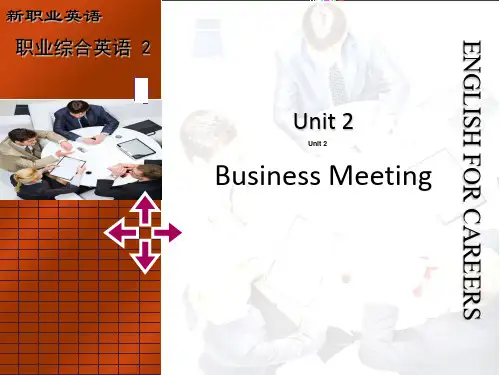
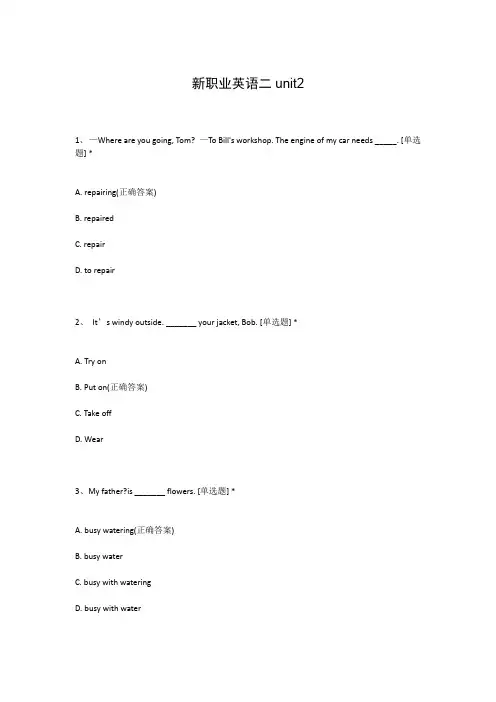
新职业英语二unit21、—Where are you going, Tom? —To Bill's workshop. The engine of my car needs _____. [单选题] *A. repairing(正确答案)B. repairedC. repairD. to repair2、It’s windy outside. _______ your jacket, Bob. [单选题] *A. Try onB. Put on(正确答案)C. Take offD. Wear3、My father?is _______ flowers. [单选题] *A. busy watering(正确答案)B. busy waterC. busy with wateringD. busy with water4、The more he tried to please her, _____she seemed to appreciate it. [单选题] *A.lessB.lesserC.the less(正确答案)D.the lesser5、Boys and girls, please _______ your favorite book here and show it to us next class. [单选题] *A. bring(正确答案)B. sellC. buyD. take6、()of the twins was arrested because I saw them both at a party last night. [单选题] *A. NoneB. BothC. Neither(正确答案)D. All7、His father always _______ by subway. [单选题] *B. go to schoolC. goes to bedD. goes to work(正确答案)8、_______ travelers come to visit our city every year. [单选题] *A. Hundred ofB. Hundreds of(正确答案)C. Five HundredsD. Five hundred?of9、When Max rushed to the classroom, his classmates _____ exercises attentively. [单选题] *A. didB. have doneC. were doing(正确答案)D. do10、John had planned to leave but he decided to stay in the hotel for _____ two days because of the heavy rain. [单选题] *A. otherB. another(正确答案)D. others11、Is there ____ for one more in the car? [单选题] *A. seatB. situationC. positionD. room(正确答案)12、I paid twenty yuan _______ the book. [单选题] *A. offB. backC. for(正确答案)D. with13、—Excuse me, how long does it ______ to walk to the library? —About 15 minutes, I’m afraid.()[单选题] *A. take(正确答案)B. spendC. costD. pay14、—______ do you pay for it? —Over the Internet. ()[单选题] *A. WhatB. How muchC. How(正确答案)D. When15、---Excuse me sir, where is Room 301?---Just a minute. I’ll have Bob ____you to your room. [单选题] *A. show(正确答案)B. showsC. to showD. showing16、37.It’s fun _________ a horse with your best friends on the grass. [单选题] *A.to ride (正确答案)B.ridingC.ridesD.ride17、41.—________ do you take?—Small, please. [单选题] *A.What size(正确答案)B.What colourC.How manyD.How much18、74.In England people drive________. [单选题] *A.on the left(正确答案)B.in the leftC.on leftD.in left19、2.I think Game of Thrones is ________ TV series of the year. [单选题] * A.excitingB.more excitingC.most excitingD.the most exciting (正确答案)20、The notice put _______ on the wall says “No Smoking”. [单选题] *A. up(正确答案)B. offC. awayD. out21、—Is this ______ football, boy? —No, it is not ______.()[单选题] *A. yours; myB. your; mine(正确答案)C. your; meD. yours; mine22、The green shorts are _______ sale for $[单选题] *A. forB. on(正确答案)C. atD. with23、73.The moonlight goes ____ the window and makes the room bright. [单选题] * A.acrossB.through(正确答案)C.overD.in24、---Where’s that report?---I brought it to you ____you were in Mr. Black’s office yesterday. [单选题] *A. ifB. when(正确答案)C. becauseD. before25、What he said sounds _______. [单选题] *A. pleasantlyB. nicelyC. friendly(正确答案)D. wonderfully26、We are looking forward to _______ you again. [单选题] *A. seeB. sawC. seeing(正确答案)D. seen27、65.There is a big sale on in the shop! Every-thing is ________ price. [单选题] *A.bigB.fullC.zeroD.half(正确答案)28、Study hard, ______ you won’t pass the exam. [单选题] *A. or(正确答案)B. andC. butD. if29、They all choose me ______ our class monitor.()[单选题] *A. as(正确答案)B. inC. withD. on30、______! It’s not the end of the world. Let’s try it again.()[单选题] *A. Put upB. Set upC. Cheer up(正确答案)D. Pick up。
新职业英语2unit Unit Two Business Meeting Meetings Are a Matter of Precious Time会议关乎宝贵的时间The meeting spills over into its second hour. We are discussing a productivity initiative. At this moment, our most talkative member chimes in with the idea that we need some kind of system to reward employees. This is the same solution he offers for every problem at every meeting. Then, another member cuts in with a long story—just to make the point that we are not the proper entity to recommend the kinds of changes we are proposing. I, meanwhile, contribute nothing useful. Finally, the woman who set the meeting calls it quits and tells us we’ll continue next week. We drift back to our offices, wondering how to make up for the wasted time. This meeting occurred many years ago, but similar ones happen at companies everywhere every day会议已经拖拖拉拉开了一个多小时,我们正在讨论如何提高生产效率的提案。
新职业英语基础篇第三版unit2
新职业英语基础篇第三版Unit 2的主题聚焦在职场沟通技巧和职业技能提升。
本单元旨在帮助学习者掌握实用的沟通方法,提高在职场的竞争力。
通过对文本的分析,我们可以提炼出以下几个关键知识点:
1.职场沟通技巧:本单元介绍了如何在职场中进行有效沟通,包括倾听、表达、提问和反馈等方面。
学习者可以通过这些方法提高与同事、上级和客户之间的沟通能力。
2.职业技能提升:单元2强调了职业技能在工作中的重要性。
学习者可以通过了解行业动态、参加培训课程和积累实践经验来提升自己的职业技能。
3.团队合作:本单元介绍了团队合作的重要性以及如何有效地进行团队合作。
学习者可以了解到,良好的团队合作有助于提高工作效率和实现共同目标。
4.职业规划:单元2提出了职业规划的重要性,并介绍了如何进行职业规划。
学习者可以根据自己的兴趣和优势,设定短期和长期目标,为实现职业生涯的发展做好准备。
为了更好地学习Unit 2,以下是一些实用的学习方法和技巧:
1.结合实际案例进行学习:学习者可以结合自己的工作经历,分析实际场景中的沟通问题和解决方案,从而加深对职场沟通技巧的理解。
2.参与角色扮演:通过模拟职场沟通场景,学习者可以锻炼自己的沟通技巧,提高应对职场问题的能力。
3.制定职业规划:学习者可以根据单元2的内容,制定属于自己的职业规
划,为自己的职业发展奠定基础。
4.深入学习行业知识:学习者可以通过阅读行业报告、参加专业培训等途径,不断提升自己的职业技能。
总之,新职业英语基础篇第三版Unit 2为我们提供了宝贵的职场沟通技巧和职业技能提升策略。
新职业英语基础篇第三版unit2摘要:I.简介- 新职业英语基础篇第三版unit2 的主题和内容概述II.课文概述- 课文的题目和主要内容简介- 课文中涉及到的主要角色和事件III.课文解析- 对课文的细节进行分析,包括关键词、短语和语法结构- 对课文中的难点进行解释和说明IV.练习题解答- 对练习题进行解答,包括选择题、填空题和阅读理解题- 提供解题思路和方法V.总结- 对本单元的学习内容进行总结和概括- 提出学习建议和拓展阅读材料正文:新职业英语基础篇第三版unit2 的主题是“职业与教育”。
课文以一个招聘会为背景,介绍了不同职业对教育背景的要求,以及教育对职业发展的影响。
课文中涉及到的主要角色有招聘者、求职者和毕业生。
课文解析:- 关键词:职业、教育、招聘、毕业生、发展- 短语:职业发展、教育背景、招聘会、求职者、工作经验- 语法结构:一般现在时、一般过去时、将来时、被动语态课文解析中,我们发现课文中使用了一些重要的语法结构,如一般现在时、一般过去时和将来时。
此外,课文还涉及到了被动语态的运用。
在理解课文时,需要注意这些语法结构的变化和运用。
练习题解答:- 选择题:根据课文内容,选择正确的答案。
例如,问:招聘者看重求职者的哪些方面?A.教育背景B.工作经验C.个人能力D.语言能力。
答案:A.教育背景。
- 填空题:根据课文内容,填入正确的单词或短语。
例如,问:招聘会上,毕业生需要展示自己的_______和_______。
答案:教育背景、个人能力。
- 阅读理解题:根据课文内容,回答问题。
例如,问:课文中提到,教育对职业发展的影响是什么?答案:教育可以为职业发展提供基础和支持。
总结:本单元的主题是“职业与教育”,通过课文和练习题,我们了解了不同职业对教育背景的要求,以及教育对职业发展的影响。
在学习过程中,我们需要注意课文中的关键词、短语和语法结构,并掌握解题思路和方法。
高职高专新职业英语职业综合英语2练习答案Unit 1 Reading A 职场时装潮流许多人每天都在捕捉职场时装的潮流,以便能与那些衣着时尚得体的人们步调一致。
他们认为按最新潮流穿衣打扮能为自己赢得时尚和时髦的好名声。
尽管这样做合情合理,你还是要小心谨慎。
许多人并没有意识到,追随职场时装潮流有利也有弊。
好处之一,正如上面所提到的,穿一套时髦的衣服去上班,很可能会得到一堆夸奖。
这种感觉很不错,也让人引以为豪。
然而事实上这种追随弊大于利。
例如,职场时装潮流往往不区分工作和职业。
在一家新潮的咖啡馆或零售店工作,着装要求很可能是休闲服。
而在一家法律或保险公司上班,着装则需要更职业化。
不幸的是,很多职场新潮时装是为工作中的一般大众而设计,而非为特定职业设计。
因此一不小心就可能出问题。
在追随这种时装潮流之前,要好好地仔细审视一下所谓的潮流。
比如,潮流是不是时兴半身裙或连衣裙,而不论其长短呢?如果确实如此,那么最重要的是要考虑自己的工作性质。
如果是办公室的职业白领,连衣裙就非常适合。
但如果是在零售店当经理,连衣裙或半身裙则可能会妨碍工作,影响工作效率。
很多人会因为穿了时髦的职场时装而备受称赞,但事情并非总是如此。
最不希望的是不但没有受到夸奖,还落下坏名声。
正是因为这个原因,你必须考虑别人对你的看法,你必须确保给别人留下的是个好印象。
到底要不要将职场最时髦的潮流带入衣柜,这个决定得自己做,但在做出决定前请考虑考虑上面提到的问题。
Reading B波音公司行为准则波音公司行为准则为全体波音公司员工制定了必须遵守的行为规范。
波音公司的企业经营建立在公平、公正的基础上,符合道德规范和法律、法规。
在企业经营中,诚信是公司处理一切关系的基础,包括公司与客户的关系、供应商和公众的关系以及员工之间的关系。
在履行公司职责时,波音公司要求员工以最高商业道德标准要求自己。
员工不得参与损害公司诚信、公平、声誉或者为公司带来麻烦的任何活动。
Unit Two Business MeetingMeetings Are a Matter of Precious Time会议关乎宝贵的时间1The meeting spills over into its second hour. We are discussing a productivity initiative. At this moment, our most talkative member chimes in with the idea that we need some kind of system to reward employees. This is the same solution he offers for every problem at every meeting. Then, another member cuts in with a long story—just to make the point that we are not the proper entity to recommend the kinds of changes we are proposing. I, meanwhile, contribute nothing useful. Finally, the woman who set the meeting calls it quits and tells us we’ll continue next week. We drift back to our offices, wondering how to make up for the wasted time. This meeting occurred many years ago, but similar ones happen at companies everywhere every day会议已经拖拖拉拉开了一个多小时,我们正在讨论如何提高生产效率的提案。